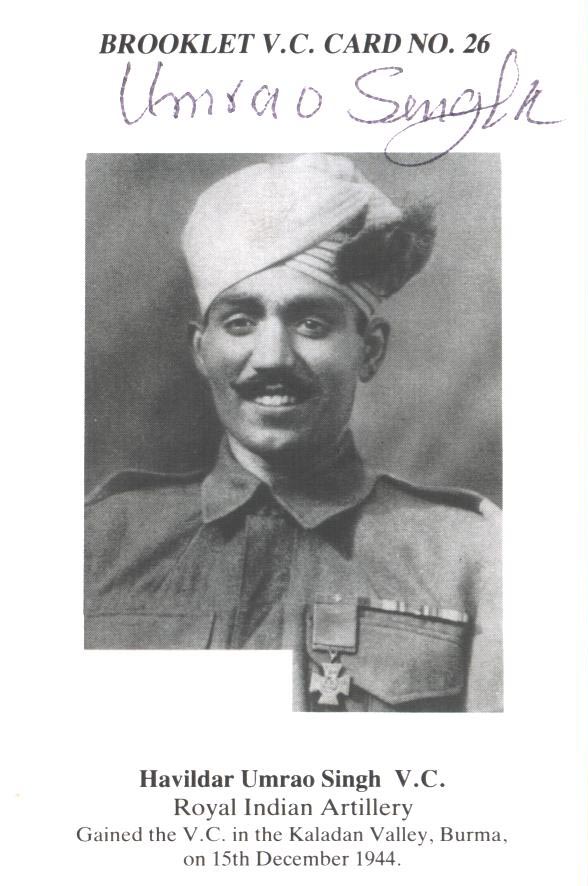
|
~SOLD~ SINGH Umrao
Capt Umrao Singh VC
Last surviving Indian Victoria Cross holder
Umrao Singh, soldier: born Paka, India 21 November 1920; VC 1945; married (two sons, one daughter); died Delhi 21 November 2005.
Umrao Singh was the only non-commissioned officer from either the Royal Artillery or the Indian Artillery to be awarded the Victoria Cross during the Second World War. He won the award for single-handedly beating back repeated attacks by the Japanese in a crucial coastal sector in Burma, even engaging the enemy in hand-to-hand combat. He was also the last surviving Indian VC holder.
On 15/16 December 1944, Havildar (sergeant) Singh of 33 Mountain Battery - part of Viscount Slim's 14th Army - was a field gun detachment commander whose position in the strategically located Kaladan Valley in the thickly forested Arakan region came under sustained attack by the Japanese 28th Army's 75mm guns and mortars. After nearly two hours of punishing bombardment, Singh's position was attacked by two Japanese companies confident that most, if not all, opposition had been pulverised.
Twice wounded by grenades during the first assault, Singh fought off the enemy with the detachment's Bren light-machine gun whilst directing his surviving crew-members' rifle fire with devastating effect. In the renewed Japanese assault, all but two of Singh's crew died, but they somehow managed to repulse the attack.
When the third assault followed, Singh's dwindling reserves of small-arms ammunition was exhausted and all his comrades lay around him, dead or badly wounded. Singh met the Japanese onslaught head-on with nothing but a hand spike, a long steel rod used to thrust shells into artillery field guns.
He fatally struck down three of the enemy before falling under a rain of blows. "They found him lying face down on the dead Japanese soldiers with his fingers still tightly clutched around the hand-spike", said Lt-Gen J.F.R. Jacob, who served with Singh during the Burma campaign. When the smoke cleared, 10 dead Japanese soldiers were found scattered around the prone Singh. Miraculously, after six hours of incessant fighting, the 24-year-old had managed to save his gun; it was pressed into action soon after and helped retain the critical sliver of territory, considerably delaying the Japanese advance further east into British-India.
Singh's citation for the Victoria Cross, which he received from King George VI at Buckingham Palace on 15 October 1945, read: "Havildar Umrao Singh set a supreme example of gallantry and devotion to duty."
Half a century later, Singh fought another equally vital, albeit less blood-spattered, battle when he complained to the British prime minister John Major at the 1995 VE Day celebrations at Hyde Park about the paltry pension of £168 annually paid to Indian VC holders. "I don't think the prime minister speaks Hindi, but when I talked to him he just said yes to everything," Singh said after their meeting.
Subsequently, the British government raised to £1,300 the yearly pension for Singh and nine other surviving winners of the VC, an award that was barred for Indian soldiers until 1912. Thereafter, through the two world wars till independence in 1947, 40 Indian soldiers got the VC.
Umrao Singh was born in 1920 into a poor farming family in Paka village in Rohtak district, some 50km north of Delhi. Like his Jat ancestors, who trace their lineage to Central Asia's warring tribes that migrated to northern India thousands of years ago, he was commissioned into the Royal Indian Artillery in the early 1940s.
In 1942 Singh was promoted to havildar in the 33 Mountain Battery Brigade, which eventually became part of Viscount Slim's 14th Army poised for a right-flank offensive against Lt-Gen Sakurai Seizo's 28th Japanese Army along Burma's western coastline between the Irrawaddy river and the Bay of Bengal. The offensive that was launched down the Kaladan Valley on 12 December 1944 was met with fierce and unprecedented Japanese resistance with Singh's batteries facing the worst.
After recovering from his injuries Singh was promoted to subadar or sergeant major and retired from the British Indian army in 1946. But after independence a year later, he signed up for duty once again before eventually retiring in 1965. He was made an honorary captain in 1970.
Singh returned home to his village - where he was known as VC Sahib - to farm his small two-acre plot from which he eked out a bare living. A friend who knew about Singh's VC and his penury-ridden state suggested he sell his medal after one was auctioned in London for £20,000. An indignant Singh said selling his medal for money would "sully" the izzat (honour) of his fallen comrades.
Signed postal cover for the Victoria Cross and George Cross Memorial Appeal
Price: $0.00
Please contact us before ordering to confirm availability and shipping costs.
Buy now with your credit card
other ways to buy
|


